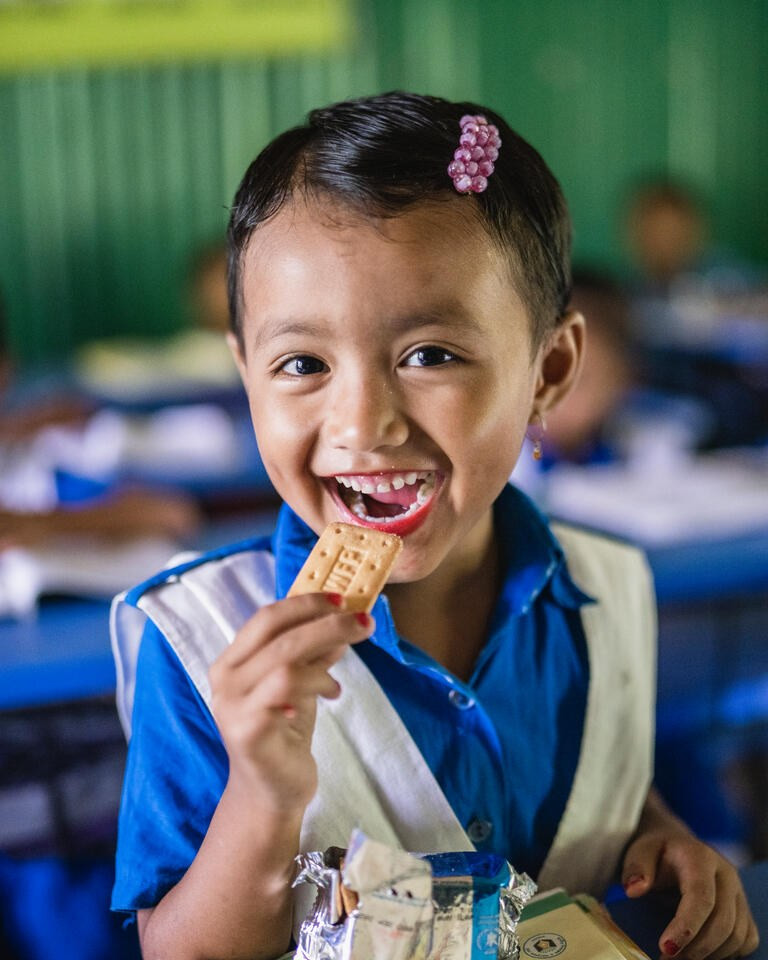School feeding programme: Why the $6 billion scheme is so crucial
In 2021, the country's last school feeding programme ended. But the need for it is still felt

On Monday, the UN Food Systems Summit began in Rome with a proposal to finance school meal programmes in low-income countries. The proposal, put forward by the Sustainable Financing Initiative (SFI) for School Health and Nutrition, highlights the need for a $6 billion-a-year scheme.
The proposal comes at a time when many countries, Bangladesh included, are overwhelmed by rising food prices. According to a report published by the Bangladesh Bureau of Statistics (BBS) last month, the monthly inflation rate in May soared to a decade-high of 9.94%.
School feeding programmes are nothing new in Bangladesh. After the liberation of Bangladesh, the government started to give school children milk powder in some impoverished areas. In 1993, the food-for-schooling programme was launched officially, offering young learners rice, pulse and cash.
Micronutrient-fortified biscuits replaced these items after 2000. In 2002, a larger school feeding programme was launched for flood-affected families in Jashore as an emergency response. In 2010, with the assistance of the World Food Programme, the programme was initiated at the national level and continued until 2021.
According to an earlier TBS report, the primary and mass education ministry spent Tk4,991 crore on the feeding programme from 2010 to 2021.
Children used to get cooked meals in 14 upazilas while students in 104 upazilas of the country used to get vitamin-enriched biscuits weighing 75 grams.
The closure of the programme came as a shock to many.
Every party involved - educationists, teachers and parents - stressed the need for continuation of the feeding programme.
In February this year, State Minister for Primary and Mass Education Md Zakir Hossain announced that a school-feeding programme would be launched in all government primary schools in June this year. But this did not materialise.
The need for it is still felt.
Nazneen Akter Neera is the headmaster of Masum Government Primary School in Chalna Bazar in Dacope Upazila in Khulna. Many of her students are from climate refugee families. Under the school feeding programme, her students used to get a packet of micronutrient-fortified biscuits.
A cooked meal would be better, but the biscuits helped a lot, she said. "Students often come without having breakfast. The biscuit was very nutritious, and it provided the students with strength."
Also, the project played an effective role in addressing nutritional deficiencies of primary school children, 100% enrollment in schools, regular school attendance, prevention of dropouts and timely completion of education.
In some areas, affluent local people were encouraged by the government to provide mid-day meals to primary students. This was materialised on an irregular basis but did not last.
Also, the coverage was negligible against 21 million students studying in 118,891 primary schools, 65,566 of which are government primary schools.
Although the Government of Bangladesh is reportedly committed to scale-up the school meal programme with its own funding by 2024, the economic hardship the country is undergoing at this moment may make it difficult to implement.
In fact, the Executive Committee of the National Economic Council (Ecnec) on 1 June 2021 turned down a Tk17,290 crore project designed to provide khichuri or other food items as mid-day meals to primary school students.
Ironically, while Bangladesh was dragging its feet over this matter, India and Pakistan have maintained mid-day and cooked meals for their students.
India's Mid-day Meal Scheme for school students is the world's largest school meal programme. The government-sponsored scheme serves 120 million children in over 1.27 million schools.
Even Pakistan, a country which has been suffering from complex and multifaceted economic and political challenges, inaugurated a free meal programme in 100 primary schools in the country in 2022, just a few months after Bangladesh discontinued its school feeding programme.
To that end, there's substantial importance of the proposed allocation of funds at the Food Systems Summit.
It is not just the money, (while money may be the key factor for some countries) organisations like SFI and School Meals Coalition have been pushing for universal access to free school meals by 2030 as a response to rising hunger.
The proposal, titled 'School meal programmes: A missing link in food systems reform,' prepared by SFI, states that, "School meal programmes are not a stand-alone strategy for food system reform – but they are among the most powerful, practical and proven levers available to governments."
"School meals programmes have an unrivalled potential to cut through the complexities of food systems, and above all really trying to develop and drive results at scale," UN Deputy Secretary-General Amina Mohammed told the morning session on Monday in Rome, as reported by global media.
"If we are to unlock the full potential of school meals for food system reform, we must extend their reach and expand their scope. Today demonstrates that we've come a long way but millions of the most vulnerable children still can't access the school meals that could transform their lives," she added.
Cristina Duarte, United Nations special adviser on Africa also stressed the need for extending school meals programmes. "School feeding is not a public expenditure, school feeding is an investment … School feeding is an entry point to deliver public service," she said.



 Keep updated, follow The Business Standard's Google news channel
Keep updated, follow The Business Standard's Google news channel
















